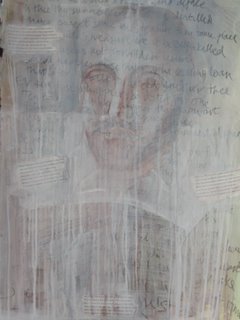
Earlier this year, I dreamed that I was having an interesting conversation with a female painter. I was looking at the paintings on the white walls of her loft and realized that all the paintings were white, creating space for attention to texture, the material substance of paint and the act of painting itself.
Over the next few months, I paid homage to the dream and the lineage of white paintings created by Ryman, Rauschenberg and others, by putting together a series of white multimedia pieces, compiled of chalk drawing, fashion magazine cut-outs, autumn leaves, straw, scrawled calligraphy, charcoal, coloured chalk, layered over by successive washes of white acrylic paint.
This Shakespeare painting is my favourite image from the white painting series. Each white wash bled the underlying chalk drawing of the ubiquitous image of Shakespeare, obscuring and partially obliterating like time, history and death, the forces evoked in Sonnets 11-12, which are also inscribed on the painting:
XI.
As fast as thou shalt wane, so fast thou growest
In one of thine, from that which thou departest;
And that fresh blood which youngly thou bestowest
Thou mayst call thine when thou from youth convertest.
Herein lives wisdom, beauty and increase:
Without this, folly, age and cold decay:
If all were minded so, the times should cease
And threescore year would make the world away.
Let those whom Nature hath not made for store,
Harsh featureless and rude, barrenly perish:
Look, whom she best endow'd she gave the more;
Which bounteous gift thou shouldst in bounty cherish:
She carved thee for her seal, and meant thereby
Thou shouldst print more, not let that copy die.
XII.
When I do count the clock that tells the time,
And see the brave day sunk in hideous night;
When I behold the violet past prime,
And sable curls all silver'd o'er with white;
When lofty trees I see barren of leaves
Which erst from heat did canopy the herd,
And summer's green all girded up in sheaves
Borne on the bier with white and bristly beard,
Then of thy beauty do I question make,
That thou among the wastes of time must go,
Since sweets and beauties do themselves forsake
And die as fast as they see others grow;
And nothing 'gainst Time's scythe can make defence
Save breed, to brave him when he takes thee hence.







